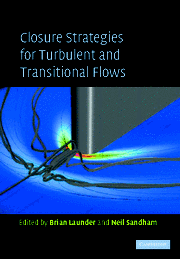5 - Numerical Aspects of Applying Second-Moment Closure to Complex Flows
Published online by Cambridge University Press: 06 July 2010
Summary
Abstract
The incorporation of Reynolds-stress closure into general finite-volume schemes, in which the discretization of convection is minimally diffusive, presents a number of algorithmic problems not encountered in schemes containing eddyviscosity models. The main problem is low numerical stability, arising from the general stiffness of the turbulence-model equations, the absence of the numerically stabilizing second-order derivatives associated with the eddy viscosity, and –in the case of a fully collocated storage of all variables –a decoupling between stresses and strains. The chapter presents a number of algorithmic measures designed to enhance the stability and rate of convergence of incompressible as well as compressible-flow solvers, the latter based on modern Riemann schemes. It also discusses aspects of the incorporation of wall boundary conditions for the Cartesian stress components in conjunction with wall laws which are formulated in wall-oriented coordinates. Two examples are included for complex 3D flows, one incompressible and the other compressible (transonic).
Introduction
Despite decades of research into the formulation, improvement and validation of second-moment closure models, the large majority of RANS codes applied in practice continue to use linear eddy-viscosity models to represent the effects of turbulence on the mean flow. The appeal of such models is rooted in their simplicity, favourable numerical characteristics and surprisingly good predictive capabilities over a fair range of conditions, especially if the basic model forms are augmented by ad hoc corrections to counteract a number of fundamental weaknesses.
While there is no argument about the fundamental superiority of secondmoment closure and the mechanisms responsible for it, there is no consensus on the degree to which this fundamental strength translates itself into practical predictive advantages and broad generality. One important source of predictive variability is the approximation of the terms responsible for redistributing turbulence energy among the normal stresses and for reducing the shear stresses in opposition to strain-induced generation. This problem is by-passed in eddyviscosity models owing to the absence of these terms in the turbulent-energy equation which is, in the large majority of eddy-viscosity models, the basis of the turbulence-velocity scale on which the eddy-viscosity depends. Other sources for inconsistent performance include difficulties with boundary conditions, especially at walls, the greater sensitivity of the solutions obtained with second-moment closure to numerical grid disposition and discretization errors, and the far greater scope for coding errors.
- Type
- Chapter
- Information
- Closure Strategies for Turbulent and Transitional Flows , pp. 153 - 187Publisher: Cambridge University PressPrint publication year: 2002
- 7
- Cited by



